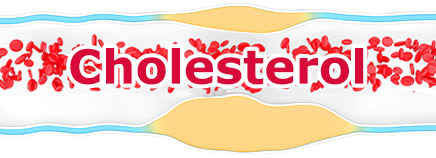Cholesterol: Fundamental For Life.
What Is Cholesterol?
Cholesterol is a substance made in the liver and it is vital to human life. You can also get cholesterol through foods, but because it can’t be created by plants, you can only find it in animal products, like meat and dairy.As fate would have it, one of the most important chemicals in human physiology to sustain life is cholesterol. Yes, this is the same cholesterol that has been so vilified over the past several decades as being the cause of everything from heart disease to global warming.
Two Kinds of Cholesterol
There are two main types of cholesterol: LDL and HDL. The cholesterol blood test tells how much of each kind you have.- Most cholesterol is LDL (low-density lipoprotein) cholesterol. This type is most likely to make something calledplaque that can clog a person's arteries. Plaque keeps blood from flowing through the body the way it should. People often call LDL cholesterol "bad cholesterol."
- HDL (high-density lipoprotein) cholesterol doesn't clog arteries. HDL cholesterol removes cholesterol from the blood vessels and carries it back to the liver, where it can be processed and sent out of the body. That's why people often call HDL "good cholesterol."
- One of the most important chemicals in human physiology to sustain life is CHOLESTEROL.
- Cholesterol is a fundamental component of every cell membrane in the human body including brain cells.
- Cholesterol is the raw material from which your body is able to manufacture Vitamin D in the sunshine.
- Cholesterol is a brain antioxidant- protecting brain cells against the ravages of free radicals.
- Cholesterol is the raw material from which we manufacture the sex hormones including estrogen, progesterone, testosterone & even cortisol as well.
It's OK to eat some food with cholesterol. You just don't want to eat too much. Many of the foods that have cholesterol are also high in saturated and trans fats. Those two kinds of fat can increase LDL cholesterol. High levels of LDL cholesterol increase a person's chances of having heart disease and strokes.
Cholesterol level in the diet should not exceed 300 mg. Liver synthesizes as much as 2 g of Cholesterol per day. The advantages of a vegetarian diet are that it is low in calories, fat & cholesterol & that it has adequate fiber which helps in binding cholesterol & increase the polyunsaturated fatty acids but also because the plant sterol inhibits cholesterol absorption.
| Foods with cholesterol | Cholesterol values per 100 g |
|---|---|
| Butter | 250mg |
| Ghee | 300mg |
| Milk (Cow) | 14 mg |
| Milk (buffalo) | 16 mg |
| Milk (Skimmed) | 2 mg |
| Milk (Condensed) | 40 mg |
| Cream | 40 mg |
| Cheese | 100 mg |
| Egg (whole) | 400 mg |
| Egg (yolk) | 1120 mg |
| Chicken without skin | 60 mg |
| Chicken with skin | 100 mg |
| Beef | 70 mg |
| Mutton | 65 mg |
| Pork | 90 mg |
| Prawns/Shrimps | 150 mg |
| Fish (Lean) | 45 mg |
| Fish (Fatty) | 45 mg |
| Liver | 300 mg |
You Need a Little, Not a Lot
Your body needs some cholesterol to help your organs grow and work. But too much cholesterol in the blood can clog the arteries that carry blood around your body. People with high cholesterol might need to take medicine to lower the amount that floats around in their blood.
If cholesterol builds up in a person's blood vessels over many years, it might lead to:
- a heart attack that can damage the heart
- a stroke that can damage the brain
Keeping These Numbers in Check
There are several things that influence your cholesterol numbers — most of which you have control over. While heredity may play a role, so too does diet, weight, and exercise.Eating foods that are low in cholesterol and saturated fats, getting regular exercise, and managing your weight are all associated with lower cholesterol levels and lower risks of cardiovascular disease.
What If You Have High Cholesterol?
If a blood test shows you have high cholesterol, talk to your doctor. He or she can give you advice on what you can do to lower your cholesterol — like eating less fried food and choosing low-fat or fat-free milk, cheese, and yogurt.
Plaque can start building up in the arteries when people are in their teens. That's why it's good to keep your heart healthy now.
Here are four things you can do:
- Eat lots of different healthy foods, especially fruits, vegetables, and whole grains.
- Get plenty of exercise.
- Stay at a healthy weight.
- Don't smoke.
NOTE: Cholesterol is Not Just Diet Related





